Government Statistical Service (GSS) Conference 2023
- Date
- 8th November 2023 9:00 am to 5:00 pm
- Venue
- Hybrid
We’re excited to announce that the GSS Conference 2023 will take place on Wednesday 8 November. The theme this year will be “Statistics and diversity: using statistics to build a more inclusive world”.
Venue
The conference will be a hybrid event. The in-person aspect of the event will take place across three Government sites:
- Office for National Statistics, Newport, South Wales
- Office for National Statistics, Titchfield, Hampshire, England
- Scottish Government, Victoria Quay, Leith, Edinburgh, Scotland
You will also have the option of attending the conference virtually on Microsoft Teams.
You can also join the conference from a hybrid location, which will dial into the main session. There will be Heads of Professions available at the hybrid locations to lead the GSS Vision sessions. There will also be opportunities for networking and socialising.
The hybrid locations are as follows:
- London Hub — 2 Marsham Street
- London Hub — 100 Parliament Street
- Northern Ireland Hub
The hybrid location at 2 Marsham Street is available to colleagues from:
- the Home Office
- the Department for Levelling Up, Housing, and Communities
- the Department for Environment, Food, and Rural Affairs
- the UK Statistics Agency (UKSA)
Please contact your Head of Profession for more information about the other hubs in London and Northern Ireland.
Speakers
We are pleased to announce that we will be welcoming back the UK’s National Statistician, Professor Sir Ian Diamond, and the Director General for Regulation at the Office for Statistics Regulation (OSR), Ed Humpherson, to this year’s conference.
We also have some fantastic keynote speakers. You can look forward to hearing from:
- Reema Patel from Ipsos UK — Reema’s keynote speech will explore how data is collected and used currently, the data divide and will draw on her own expertise on public engagement to foster inclusivity
- Richard Laux from Cabinet Office — Richard will talk about equalities data and analytical approaches, some features of data that analysts need to bear in mind, and different approaches to thinking about the analysis of inequalities
- Zamila Bunglawala from the London School of Economics (LSE) International Inequalities Institute — Zamila will speak about her experience of starting the Race Disparity Audit, diverse data but limited utilisation; data presentation and diverse users; limited diversity at senior data community level; and the hope that open data leads to open democracy
Delegates
Allocations are being finalised and all delegates should receive an email with further information soon. In the week before the conference you should also receive details about the day including agenda for the day and venue information.
Colleagues who wish to attend online will receive a Microsoft Teams link from their Head of Profession (HoP) a few days before the conference.
Agenda
The agenda for the conference is as follows:
- 09:30 to 10:00 — attendees begin arriving in Newport, Titchfield, and Edinburgh
- 10:00 to 10:30 — Welcome Address from Professor Sir Ian Diamond
- 10:35 to 11:05 — Keynote Speech from Richard Laux
- 11:05 to 11:35 — Wellbeing Break
- 11:35 to 12:05 — Parallel Session 1
- 12:05 to 12:35 — Parallel Session 2
- 12:35 to 13:00 — Analysis Function Learning Offer
- 13:00 to 14:00 — Lunch
- 14:00 to 14:30 — Keynote Speech from Reema Patel
- 14:35 to 15:05 — Parallel Session 3
- 15:05 to 15:30 — Break
- 15:30 to 16:00 — Keynote Speech from Zamila Bunglawala
- 16:00 to 16:25 — Head of Profession Session
- 16:25 to 16:45 — Closing Remarks from Ed Humpherson
- 16:45 — social events begin in Newport, Titchfield, and Edinburgh
Parallel Sessions
The parallel sessions will be different depending on your location.
Delegates attending the conference online will be able to choose which parallel session they want to attend. Links will be made available on the day of the conference.
Newport
Sofi Nickson will lead a parallel session in Newport called “Statistics for everyone: understanding what it means for statistics to serve the public good”.
As a member of the GSS you contribute to the production and dissemination of statistics, but how often do you think about the wider purpose behind what you do?
Join the Office for Statistics Regulation (OSR) for a session where we examine the core objective of our statistical system: promoting and safeguarding the production and publication of official statistics that serve the public good. We will delve into research and share with you our thought processes to clarify what “statistics that serve the public good” may mean both in theory and in practice. Our session will bring in a diverse range of voices from members of the public, statisticians, researchers and even international perspectives, which we will consolidate into a single statement about “statistics that serve the public good”.
Discover the latest findings on what it means for statistics to serve the public good and take this opportunity to join the conversation. As serving the public good is a common goal for us all, we invite you to listen to what we know so far and tell us what it means for you. Your insights alongside our wider evidence will influence how we regulate and support the statistical system, ensuring that collectively we can all make sure that statistics serve the public good.
Titchfield
Rosa Alonso will lead a parallel session in Titchfield called “Mapping the UK: an analysis of social mobility across regions”.
Diversity and statistics converge in a powerful way with the Social Mobility Commission (SMC) Data Explorer Tool, a transformative project that revolutionises the presentation of complex statistical analysis.
The SMC exists to help create a country where a person’s childhood circumstances does not determine their outcomes in life. Our data tool represents a shift in how we disseminate information on social mobility measures across the UK.
As a complement to our State of the Nation 2023 annual report, we present an interactive dashboard that brings data to life with visual insights and user-friendly features. It includes over 40 indicators that cover different aspects of social mobility, allowing users to:
- compare data from different years and areas
- interact with graphs and maps
- download information
Our aim is to empower stakeholders and policymakers with data-driven insights to inform policy decisions and create a comprehensive understanding of regional differences. Our analyses break down data by geography (International Territorial Level 2) and protected characteristics like sex, ethnicity, and disability. Notably, the introduction of composite indices enhances our regional analysis, allowing us to combine data and provide reliable breakdowns at a regional level.
The main features and functionalities, guided by user research, make this tool accessible. Intuitive navigation, comparative analysis, interactive visualisations, export capabilities, and periodic updates empower users to tailor their exploration and deepen their understanding of complex social mobility dynamics. A user-centred design and accessibility considerations, including help text and pop-up windows, ensure that the tool is inclusive for all users.
In summary, this innovative tool simplifies complex statistics, making them more accessible and useful for everyone. It’s a game-changer in the world of diversity and statistics, providing valuable insights for decision-makers and the public.
Edinburgh
Rhian Armstrong will lead a parallel session in Edinburgh called “Prioritising broadband affordability support using latent class analysis”.
In response to the pandemic and the later cost of living crisis, Ofcom has collected data on households’ experiences of affording communication services. The promotion of social tariffs, offering reduced-cost broadband to eligible households, is another major response. This session will explore the application of latent class analysis to the survey data to identify demographic profiles of households at a higher risk of broadband affordability issues, enabling targeted promotion of these social tariffs.
Our objective was to identify prevalent demographic combinations associated with higher risk of broadband affordability issues rather than analysing demographics in isolation.
Using latent class analysis, we segmented respondents based on demographics and affordability issues. This produced four distinct classes:
- High Affordability Issues — younger, lower-income households with children, out of work, or with limiting conditions
- High Affordability Issues — low-income, out-of-work households with fewer occupants and no children
- Lower Affordability Issues — higher-income, smaller households without children
- Lower Affordability Issues — young, employed individuals with few limiting conditions
We identified characteristics common to the segments at higher risk, such as being young and out of work. We recommended targeting them in ISPs’ social tariff advertising, and used these insights ourselves when running Facebook advertisements for these services.
This study emphasises the importance of considering demographics collectively to address communication service affordability. It enables Ofcom and ISPs to optimise their outreach efforts, supporting vulnerable households during economic challenges.
Newport
Rebecca Vincent and Anita Patel will lead a parallel session in Newport called “The changing shape of childcare in England”.
Childminders offer flexible childcare that can meet diverse and varied needs of working parents. Many parents rely on this kind of childcare, often located closer to home, to accommodate more varied working patterns, including wrap-around care.
Reforms to increase the free childcare entitlement announced in the 2023 spring budget aim to increase the number of childcare places to close gender gaps in the labour market. However, in the past decade, the number of childminders has declined by 50%. There were 56,200 registered childminders in 2013 and there are 27,900 registered childminders in 2023. We know from previous analysis that the availability of childcare providers is substantially lower in the most deprived areas, limiting the ability of parents to balance work with family commitments. These same areas also have the lowest proportion of childcare providers judged good or outstanding by Ofsted.
This presentation will:
- give an overview of a fast-paced linkage project using data assets from Ofsted, DLUHC, Census21, and ONS Data Science Campus to support policy colleagues understand the childminder profession and the availability of childminders to parents living and working in different areas the country
- address critical issues for the childcare market, including an understanding of the demographics and location of childminders, alongside those joining and leaving the profession
- explore the characteristics of properties used by childminders to further understand who is working in the childminder profession and the factors that could prevent prospective childminders who are younger or living in more deprived areas from registering
- share analysis on the accessibility of childminders to parents across the country and from different socioeconomic backgrounds, making use of Census21 and ONS travel isochrone data to explore the proximity of childminder places to residential areas and workplaces
- outline our plans to track changes in the childcare market during ongoing reforms
Titchfield
Amy Baxter will lead a parallel session in Titchfield called “Understanding the gender pay gap”.
The gender pay gap is an equality measure that shows the difference in average earnings between women and men. The UK gender pay gap is at its lowest level ever, but still at 18%. The causes of the gender pay gap are complex and overlapping.
In this presentation we will examine:
- the main causes of the gender pay gap and why it persists
- the latest figures from the Civil Service Statistics release for the Civil Service workforce as at 31 March 2023
- the main measures and methodologies we can use to understand the gender pay gap
- case studies to demonstrate the reasons why the gender pay gap persists, and what is being done to understand and address these
Edinburgh
Allan Baker will lead a parallel session in Edinburgh called “Monitoring progress to address health inequalities in England: an introduction to the Health Inequalities Dashboard”.
The Health Inequalities Dashboard was developed to answer the question of whether there have been significant changes in levels of inequality for key health indicators in England.
The dashboard was produced by the Office for Health Improvement and Disparities (OHID). It is an interactive tool which gives users evidence to monitor progress in reducing health inequalities in England.
The dashboard covers themes such as child health, behavioural risk factors, and the wider determinants of health. It shows inequalities in risks and outcomes between different population groups. Many indicators are provided by level of socio-economic deprivation, but breakdowns are provided by other factors, including sex, ethnicity and sexual orientation, where data are available.
This presentation will introduce the dashboard and outline planned future developments.
Newport
Kunal Deshpande will lead a parallel session in Newport called “Bridging the gap: harnessing statistics for inclusive diversity in the 21st century”.
Statistics play an important role in creating inclusion in an era of increasing variety and interconnectedness. This talk will look at the intersection of statistics and diversity, concentrating on how statistical insights might lead to a more inclusive world, using official census data from 2021.
This presentation will address three vital points about ethnic-nondisclosure and how to make census more accurate while making current data more accessible.
Titchfield
Katherine Harris will lead a parallel session in Titchfield called “Keeping count of the traveller community”.
Traveller, Gypsy, and Roma communities are widely considered to be among the most socially excluded communities in the UK. Twice a year the Department for Levelling Up, Housing and Communities (DLUHC) publishes counts of traveller caravans and pitches on socially rented, privately funded and unauthorised sites. This is based on data collected from local authorities across England and provides a unique picture of traveller caravan numbers and locations.
This presentation will cover:
- the latest statistics and context on this topic
- the importance of these statistics to policy makers and service providers
- the importance of these statistics to inform comprehensive population estimates
- methodology in data collection and recent improvements in processing
Edinburgh
Saman Rizvi will lead a parallel session in Edinburgh called “Beyond one-size-fits-all in Massive Open Online Courses (MOOCs): variation in learning design and persistence of learners in different cultural and socioeconomic contexts”.
Online learning spaces, such as Massive Open Online Courses (MOOCs), offer the potential to provide affordable and widely accessible education. However, research has shown that persistence and completion rates are concentrated in specific, developed, predominantly English-speaking regions.
The way open online courses are designed potentially influences learners’ persistence. Enrolment and persistence vary along geo-cultural and socioeconomic dimensions, as well as with learning design features such as number of instructional videos, reading material, discussion activities and quizzes. Despite diverse enrolments, most online course providers adopt a one-size-fits-all design that presents the same type and proportion of activities to all learners.
Extensive learning analytics research has been conducted on the analysis of voluminous behavioural data produced and stored in course logs. However, limited work has considered variability in the contexts in which the behaviour occurred. In this presentation we will explore how learning design elements can be adapted to improve diverse learners’ persistence.
Head of Profession Session
The GSS is part of the Analysis Function, which is made up of people from different professions working for different departments, agencies, and devolved administrations. So, when does it make sense to work together as “one GSS community”? When is it better to work within individual departments or bodies? How do we make the GSS as coherent and inclusive as possible? How can we make the GSS bigger than the sum of its parts?
Join this interactive session to have your say and shape the future of the GSS. This session will be hosted by:
- Jessie Evans and Steph in Newport
- Jane Naylor and Lucy Vickers in Titchfield
- Steve Ellerd-Elliott and Ally McAlpine in Edinburgh
Meet the organising team
Eleanor Cuzner
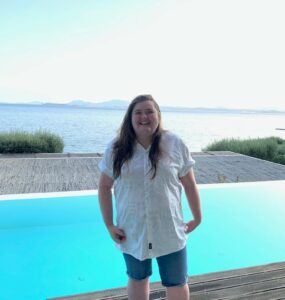
Eleanor is based in Bournemouth and works for the UK Statistics Authority (UKSA).
Favourite random statistic or publication
More people in the world own mobile phones than toothbrushes!
Favourite subject at school
My favourite subject was geography.
What would you be doing if you were not a statistician?
I would have my own women’s football podcast.
Ben Peters
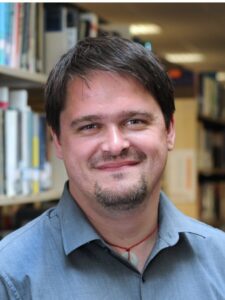
Ben is based in London and works for the Department for Energy Security and Net Zero (DESNZ).
Favourite random statistic or publication
My favourite publication is the Digest of United Kingdom Energy Statistics (DUKES).
Favourite subject at school
My favourite subject was PE.
What would you be doing if you were not a statistician?
I would be a gardener.
Beth Cunningham

Beth is based in Manchester and works for the Department for Education (DfE).
Favourite random statistic or publication
I like any statistics that tell me eating chocolate is good for me!
Favourite subject at school
My favourite subject was PE.
What would you be doing if you were not a statistician?
I would probably own a sweet shop.
Cheena Ghataoura

Cheena is based in London and works for the Department for Education (DfE).
Favourite random statistic or publication
It’s not really related to statistics, but applications of Artificial Intelligence (AI) have always fascinated me. One of the applications which still baffles me is how robots can judge a beauty contest! This is where robots are trained to detect face symmetry and features, including wrinkles, skin health, ageing factor, and other related factors. Humans take a photo of themselves and submit it to the robot for evaluation based on data that has already been supplied to them. The robots can detect and analyse the data online. It supports the robotic jury in comparing the results and finalising Beauty Queen and King.
Favourite subject at school
My favourite subjects were maths and space science.
What would you be doing if you were not a statistician?
I would be an astronaut.
Emma Campbell
Emma is based in Newport and works for the Office for National Statistics (ONS).
Favourite random statistic or publication
I love a good academic article, especially from medical journals!
Favourite subject at school
My favourite subject was biology.
What would you be doing if you were not a statistician?
Before coming to ONS I was a cancer research scientist. I loved that!
Mahima Zain
Mahima works for Ministry of Defence (MoD).
Carolyne Tah
Carolyne works for the Office for National Statistics (ONS).
Riya Atanasova

Riya is based in Dundee and Edinburgh and works for Scottish Government.
Favourite random statistic or publication
My favourite random statistic is that there are still an average of 7 cases of plague each year in the US and 80% of these are of the bubonic form.
Favourite subject at school
I always enjoyed languages at school, starting with French at nursery and primary, then Russian and English at secondary school. My favourite subject was always Bulgarian Language and Literature though and I briefly dreamt about being a writer or journalist.
What would you be doing if you were not a statistician?
I most likely would have stayed in academia and pursued a career in Neuroscience which was the original plan. Or I would have followed that dream of being a writer or journalist.
Joseph Bull

Joe is based in Leeds and works for the Department for Work and Pensions (DWP).
Favourite random statistic or publication
93% of people don’t check facts they read on the internet. Or is it 94%…?
Favourite subject at school
My favourite subject was maths.
What would you be doing if you were not a statistician?
I would be a food critic.
Lucy Horner

Lucy is based in Kilwinning and Glasgow and works for the Accountant in Bankruptcy.
Favourite random statistic or publication
There are more trees on earth than there are stars in the Milky Way!
Favourite subject at school
My favourite subject was music.
What would you be doing if you were not a statistician?
I like to think I would be doing something music related.
Lisa Whyte
Lisa is based in Edinburgh and works for Scottish Government.
Camilla Somers
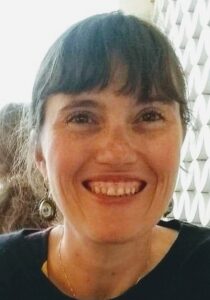
Camilla is based Glasgow and works for Public Health Scotland.
Favourite random statistic or publication
I try to catch the British Medical Journal’s Christmas Edition which can usually bring some statistical festive cheer!
Favourite subject at school
My favourite subject was history.
What would you be doing if you were not a statistician?
I would do something related to food.
Fabiana Macor
Fabiana is based in London and works for Ministry of Justice (MoJ).
Annie Campbell
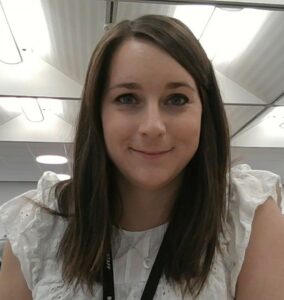
Annie is based in Cardiff and works for Welsh Government.
Favourite random statistic or publication
I always love seeing the trends in baby names and how they change over time, as well as seeing all the unusual and unique names.
Favourite subject at school
My favourite subject was art.
What would you be doing if you were not a statistician?
If I had infinite money then I would be travelling the world!
Rebecca Smith

Rebecca is based in Glasgow and works for Data and Analytics Team at SQA.
Favourite random statistic or publication
As of 2021, there are more mobile phones in the world than people!
Favourite subject at school
My favourite subject was mathematics — thanks to some wonderful teachers and their motivational cake Fridays!
What would you be doing if you were not a statistician?
I would be an artist or work in arts-based research.
Matt Heery
Matt works for Cabinet Office.
Haydn Gill
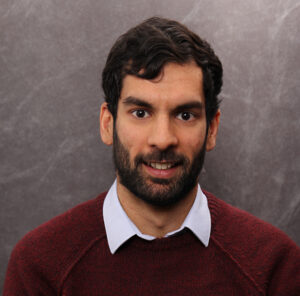
Haydn is based in Bristol and works for the Office of Rail and Road (ORR).
Favourite random statistic or publication
My hometown of Cardiff was once crowned the Greggs capital of the UK, with one Greggs for every 19,000 people.
Favourite subject at school
My favourite subject was geography. I spent the lessons reading the geography textbook in full – it was an engaging read!
What would you be doing if you were not a statistician?
I have always dreamed of owning and running a café which would only serve hot drinks and fish finger sandwiches, with discounts if people walk or cycle.
Mark Ranganathan

Mark is based in London and works for the Department for Business and Trade.
Favourite random statistic or publication
Most of the London Underground network is above ground. 55% of the network is above ground and only 45% is actually underground.
Favourite subject at school
My favourite subject was maths.
What would you be doing if you were not a statistician?
I would be an operational researcher.
Menna Zayed
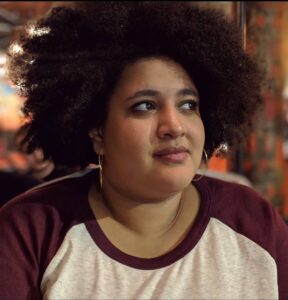
Menna is based in Leeds and works for HM Revenue and Customs (HMRC).
Favourite random statistic or publication
Every minute humans shed an average of over 30,000 dead skin cells.
Favourite subject at school
My favourite subject was biology.
What would you be doing if you were not a statistician?
I would be a chef.
Ally Turner
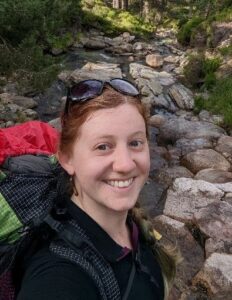
Ally is based in Salford and works for the Department for Energy Security and Net Zero (DESNZ).
Favourite random statistic or publication
An amazing 98% of Norway’s electricity is generated from renewable sources.
Favourite subject at school
My favourite subject was art.
What would you be doing if you were not a statistician?
I would be a marine biologist. Or maybe I would just spend all my time hiking in Scotland.
